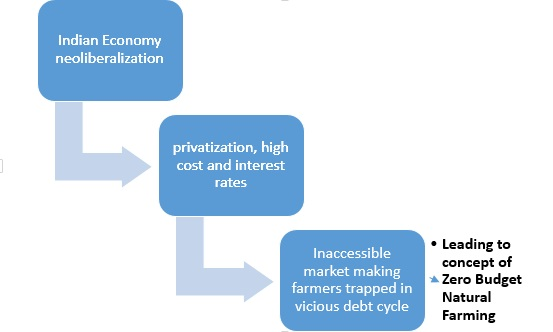The Industrial sector in India has witnessed rapid growth in the past few years, and such rapid industrial growth has increased the threat to the environment. Besides rising issues like polluted air and water, soil degradation at an alarming rate is a new concern. This issue has been ignored at the national level in India due to a lack of comprehensive information on the subject. Still, now the Central Government is serious about upgrading soil health. Recently, Andhra Pradesh has signed an MOU with a German Firm, KfW, with an aim to transit 6 million farms/farmers to 100% chemical-free agriculture by 2024 through Zero Budget Natural Farming or ZBNF.
Before going deep into what is ZBNF or Zero Budget Natural Farming let’s understand how it evolved.
Zero Budget Natural Farming Evolution

What is Zero Budget Natural Farming?
The word Zero Budget refers to the zero cost of production of all crops. Zero Budget Natural Farming is a climate-resilient alternative to the present paradigm of high-cost chemical inputs-based agriculture where the cost of growing and harvesting plants is zero. In other words, Zero Based Natural Farming is a natural farming technique which uses biological pesticides eg indigenous seeds, biostimulants, organic residues in the soil etc instead of chemical-based fertilizers to ensure healthy growth of crops.
The ZBNF concept was promoted by Subhash Palekar, a well-known Agriculturist and Padma Shri awardee in 1990s as a substitute to the Green Revolution’s methods. The government has been working hard to promote ZBNF farming under Paramparagat Krishi Vikas Yojana (PKVY).
States Implementing Zero Based Natural Farming
Karnataka is the pioneer of Zero Based Natural Farming where it evolved as a movement by the State Farmers Association named Karnataka Rajya Raitha Sangha along with the efforts of Subhash Palekar. Currently, Kerala, Andhra Pradesh, Himachal Pradesh, Chhattisgarh are implementing Zero Based Natural Farming.
Principles of ZBNF
- No external inputs
- Minimal soil disturbance
- Biostimulants – necessary catalysts
- Indigenous seed utilization
- Mixed cropping
- Water and moisture conservation
- Enhancement of organic residues on the soil
- Pest management through botanical extracts
- No use of synthetic fertilizers, pesticides, herbicides
Four Wheels of Zero Based Natural Farming
Zero Based Natural Farming has four pillars mentioned as below
- Jiwamrita– to convert non- available nutrients into an available form
- Bijamrita– seed treatment solution before sowing
- Mulching– to conserve soil moisture
- Waaphasa– to maintain moisture-air balance
Benefits of Zero Based Natural Farming
- Reduce farmer’s cost by eliminating external inputs thus increasing incomes and using in situ resources to rejuvenate soils.
- Restore ecosystem health through diverse, multi-layered cropping system.
- Less use of water and electricity as compared to chemical and organic farming.
- A resilient food system is the need of the day due to the variability of the monsoons and declining groundwater and Zero Budget Natural Farming is the answer.
- Expenditure on the main crop is recovered from the short duration intercrops income thus making net expenditure on the main crop as zero.
- Zero Based Natural Farming works in harmony with the Principles of Agroecology thus effective in addressing climate change uncertainties.
- Ensure that farming is economically viable by enhancing farm biodiversity and ecosystem services.
- Reduces methane emissions through multiple aeration.
- Minimize residue burning by mulching practicing.
- Lower cultivation cost.
Way Forward
There is a dire need for scientific intervention in agriculture to sustain soil health by improving its fertility and working towards balanced fertilisation and integrated nutrient management.The concept of Zero Based Natural Farming is good to revive soil fertility and work in harmony without disturbing ecological balance but to make it more fruitful and successful farmer to farmer connections are vital. Different State Agriculture Departments should come up with more resources and schemes to motivate more farmers to adopt this practice. Although dedicated schemes like Rashtriya Krishi Vikas Yojana and Paramparagat Krishi Vikas Yojana provide funds to such farming but lot more needs to be done.
To help you prepare 50% faster for competitive exams, ixamBee provides a free Mock Test Series and all the Current Affairs in English and Current Affairs in Hindi in the BeePedia capsules for GA Preparation. You can also get the latest updates for Bank PO, Bank Clerk, SSC, RBI Grade B, NABARD, and Other Government Jobs.
Also Read
List of Agriculture Organizations In India
квику займзайм на телефонзайм быстро на карту














